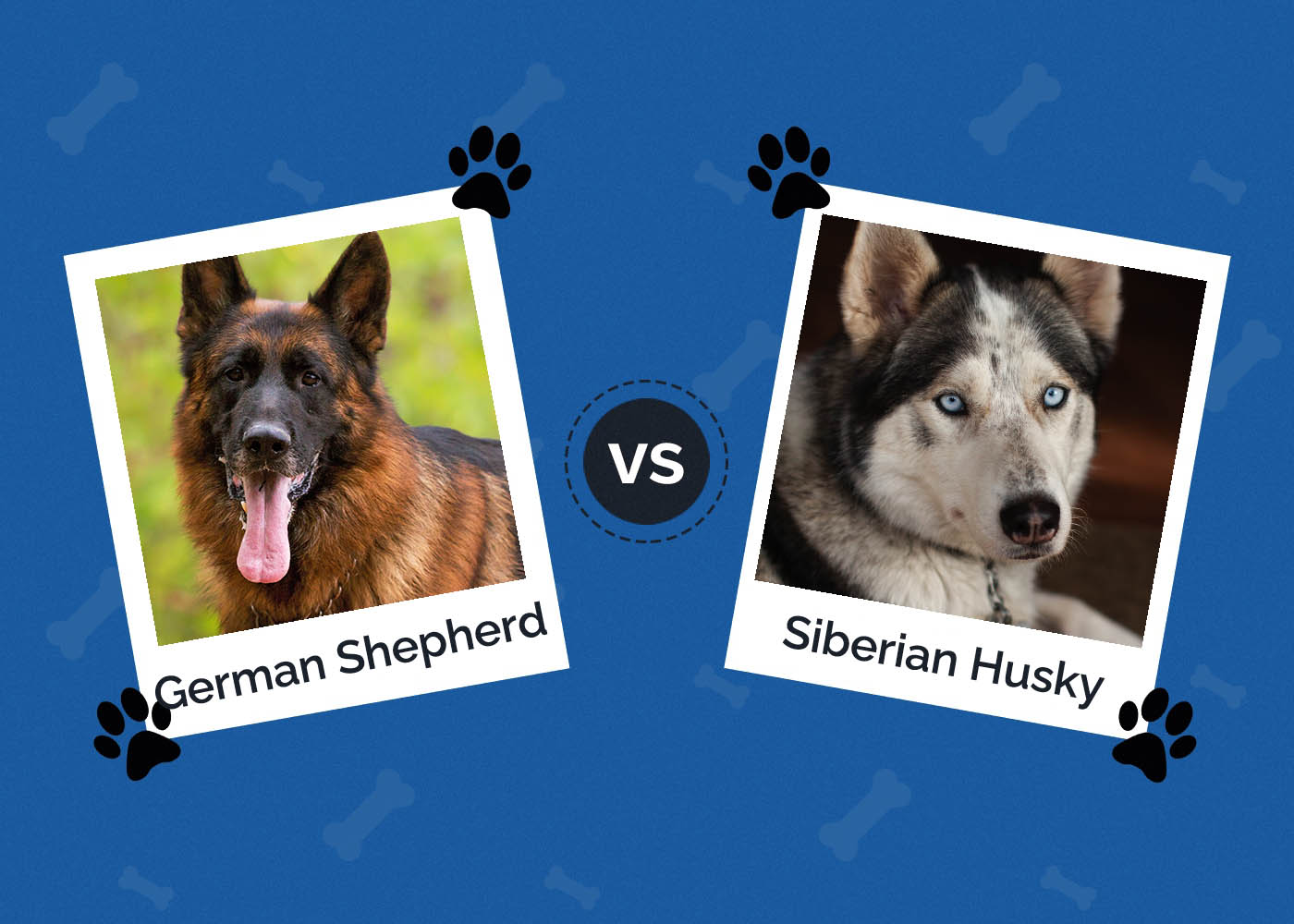Bernese Mountain Dog Breed Info: Pics, Puppies, Facts & Traits

Updated on
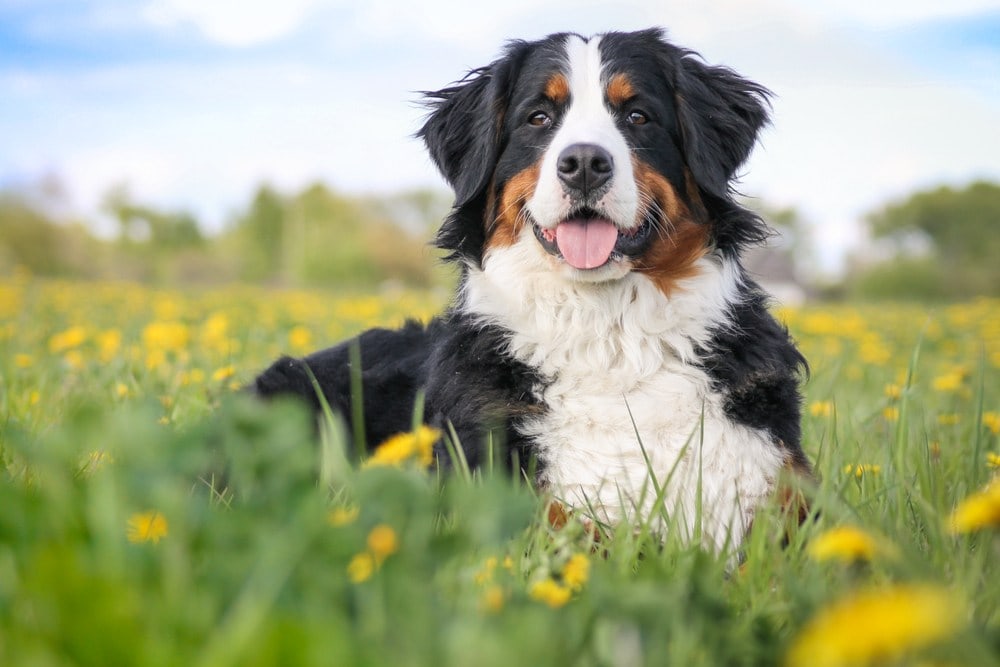
| Height: | 23 – 28 inches |
| Weight: | 70 – 115 pounds |
| Lifespan: | 6 – 8 years |
| Colors: | Black, white, brown |
| Suitable for: | Families of any size, families with children, owners with large properties, attentive owners |
| Temperament: | Calm, Cheerful, Intelligent, Alert, Friendly, Playful |
The Bernese Mountain Dog is a truly loveable breed, most recognized for its large size and friendly personality. This is the “gentle giant” of the dog world, and they are as loving as they are large! They may look intimidating, but they are very affectionate and welcoming dogs when it comes to you and your family, and they’re usually friendly toward strangers as well.
This breed’s size is indicative of the room they’ll need to feel most comfortable. Although they will love spending time with their owners, they’ll also be happiest with large yards where they can run and play. Because they were bred as working dogs, they’ll enjoy keeping a close watch over your home as well.
If you’re looking for a dog that is emotionally attached and affectionate but can also protect you and your home, the Bernese Mountain Dog may be for you — as long as you can handle their size. We’ll go over everything you need to know below so you can decide if this is the breed for you.
Bernese Mountain Dog Puppies
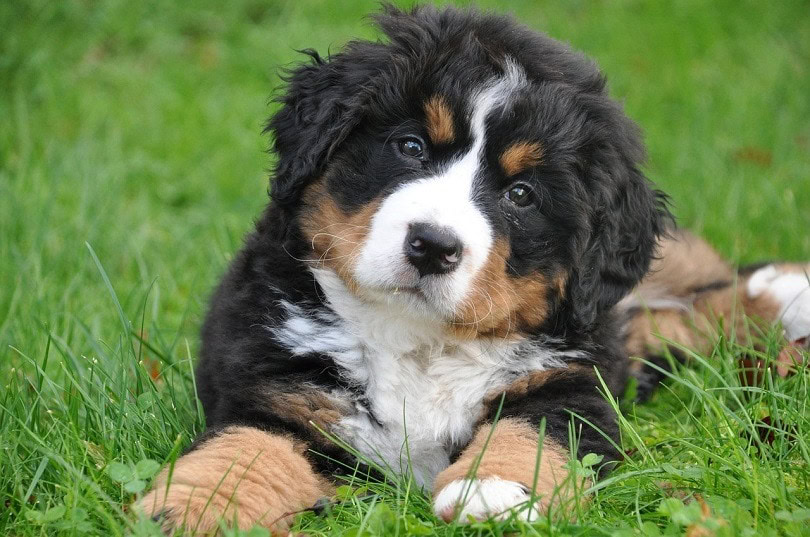
Bernese Mountain Dog puppies are adorable balls of fluff, but don’t be fooled into taking home more than one! This breed is named the tenth-largest dog breed according to the American Kennel Club, and they often grow to be more than 100 pounds. Those little fluffs can quickly become massive, powerful dogs that can be physically hard to control on walks, so just one will do.
This dog was bred as a working breed, specifically for pulling carts and herding cows, and as watchdogs. They’re extremely alert and will let you and everyone in the neighborhood know if they think there’s any kind of threat to you or your property. This, combined with their size, means they aren’t suitable for apartment dwellers or for those who can’t handle some loud barking from time to time.
Despite their strength and girth, these are very sensitive dogs who don’t deal well with negative reinforcement. They’ll seek to please any owner who establishes themselves as a leader, but their feelings will get hurt if they’re reprimanded or spoken to in a negative tone.
3 Little-Known Facts About the Bernese Mountain Dog
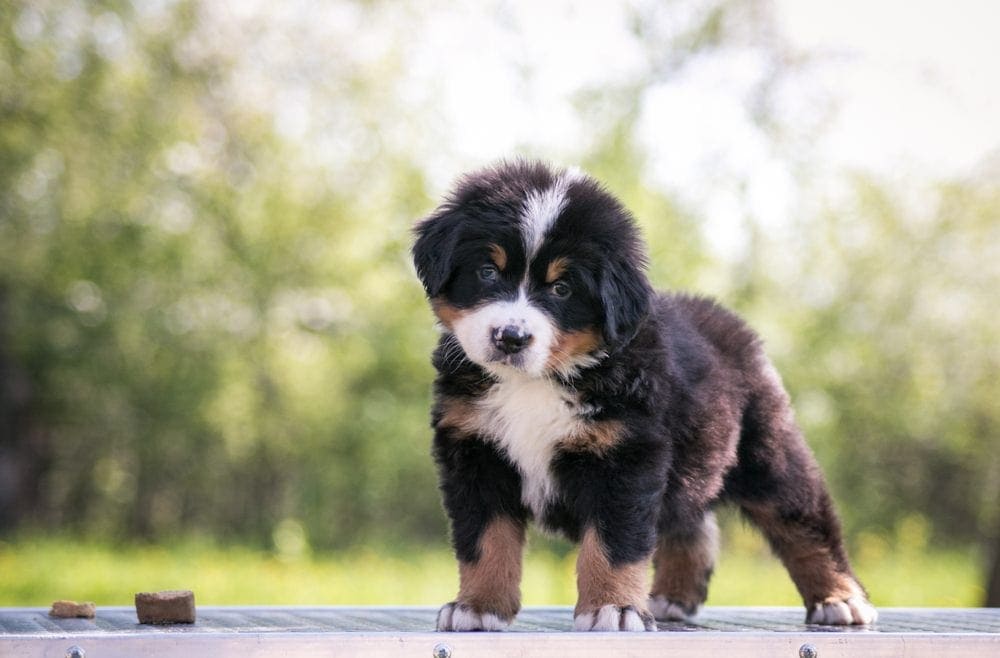
1. They’re Great with Children
Bernese Mountain Dogs are known to be one of the friendliest breeds around, and their attitude and gentleness with children only serve to support that reputation. Not only will these dogs be gentle with kids, but they’re also very tolerant of children who may play too roughly. They somehow know that kids need a little more patience than other humans.
Perhaps the best part about how these dogs interact with kids is how they’ll protect them. Many breeds are protective sometimes to a fault, but Bernese Mountain Dogs are usually very good at assessing if something or someone is a real threat, so you won’t have to worry about your dog attacking a child’s friend during a playdate.
2. They Mature Very Slowly
One of the most joyous things in the world is a puppy acting like a puppy, and with this breed you’re in for some extended puppy time! Bernese Mountain Dogs may grow physically into full-grown dogs quickly, but their minds are slower to mature than with other dog breeds.
This is not to say your pup won’t be intelligent, because they will. The quintessential puppy behavior that we all know and love will just be extended and enjoyed longer. They’ll be playful and somewhat mischievous, and they’re not quick to lose interest in games like keep-away and being chased.
3. We Almost Lost the Breed Altogether
These dogs originated somewhere in the 18th century when they were bred as working dogs to work on farms pulling carts, herding, and protecting crops. When alternative breeds became available to the Swiss farmers which brought them to popularity, this breed nearly became extinct.
Thankfully, a small group of Swiss people sought to preserve the breed, and we owe them for their popularity again today. It’s likely that the decline in numbers led to many of the Bernese Mountain Dog’s health issues, as rebuilding the population meant pulling from a small gene pool. Even so, this dog remains a popular breed today after nearly being lost altogether.
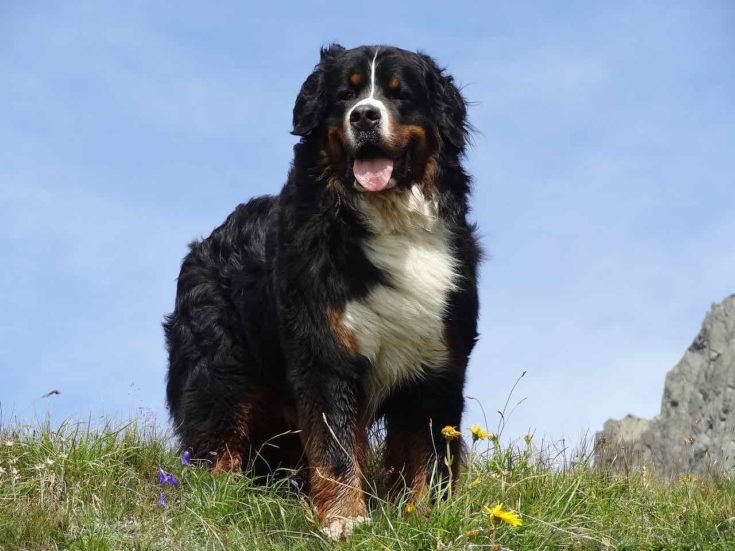
Temperament & Intelligence of the Bernese Mountain Dog
The Bernese Mountain Dog is a large, lumbering pup that has as much love in their hearts as they do fur on their large frame. They are very affectionate dogs that love cuddling and human interaction, and they’ll always love being around you and your family.
They are regarded as one of the friendliest dog breeds out there. Whether you’re introducing your pooch to close family, distant relatives, other dogs, or complete strangers — as long as there is no obvious threat — your dog will enjoy pets and play with just about anyone. Expect your Bernese Mountain Dog to be a big, emotional, and sensitive mush.
Are These Dogs Good for Families?🏡
Bernese Mountain Dogs are excellent family dogs, as they carry a lot of affection and love that will happily be shared with anyone in your house. This includes people of all ages, including children, and this breed’s friendly nature will extend to strangers they meet on walks, at the dog park, and anyone coming to visit.
These dogs are big babies and love human interaction, so the more people you have around, the happier they will be! In fact, these dogs crave attention and company more than anything else, so whether they’re relaxing inside, playing outside, or keeping watch of your property, they’ll always be happier if someone is around. So, these dogs are not suitable for homes where they will be left alone for long stretches of time, so if you and everyone in your household works or goes to school, you’ll want to consider a more independent breed.
Bernese Mountain Dogs also have big personalities. They are often goofy and playful, and they enjoy being the center of attention. They’re likely to become key parts of your family dynamic and will bring a lot of joy to everyone in your household.
Does This Breed Get Along with Other Pets?🐶 😽
These pups are usually as good with other dogs as they are with strangers. You won’t often see a Bernese Mountain Dog being unfriendly or aggressive toward any other animal. They also don’t have a high prey drive, so they’re unlikely to chase a cat or other small animal around or lunge at squirrels or rabbits when outside. As long as your other pet is okay with your big lumbering pooch, the interaction between them should be positive.
It’s important to remember the size of these dogs, especially in relation to other animals you may have. A Bernese Mountain Dog will happily play with other pups and even cats if the other animal is willing, but you should watch to make sure things don’t get out of hand accidentally. There isn’t a malicious bone in this breed’s body, but sometimes they don’t know their own strength!
Things to Know When Owning a Bernese Mountain Dog:
Food & Diet Requirements🦴
These dogs eat large quantities, and they eat often. Be prepared to feed your furry friend about four to six cups of food every single day once they’re fully grown.
The diets of many dog breeds change from puppyhood to adulthood, and this is particularly true of this breed. Until they reach about six months old, you’ll want to feed your pup three times a day and about a cup at each feeding. From six months to about eight months you can decrease the frequency to twice a day and up each feeding to about two cups each. Finally, between eight months and a year old they can be fed once per day, but their serving should be between four and six cups of food. Speak with your vet multiple times in the first year to ensure your pooch is growing at a healthy rate and getting all of the nutrients they need.
You should only feed your pup a high-quality dog food that’s rich in protein and will help them grow properly. Be careful not to overfeed, as this breed is prone to several joint issues that can be made worse by weight gain beyond their healthy weight.
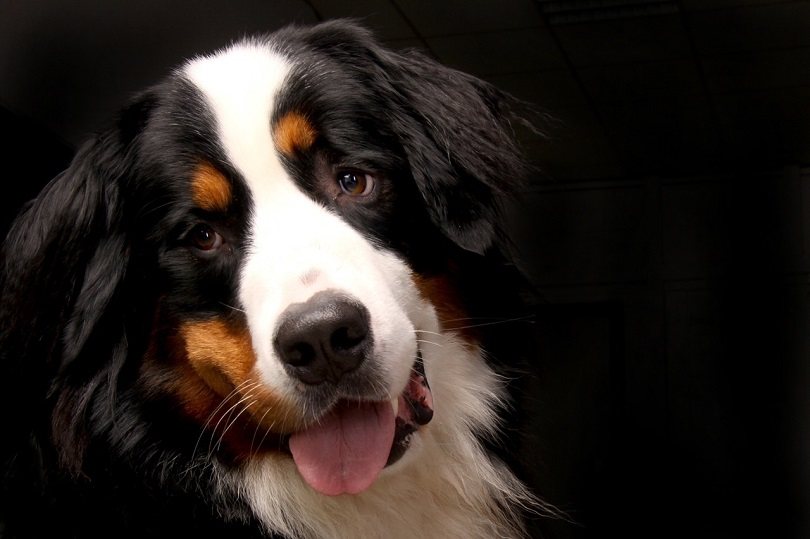
Exercise🐕
Although these dogs are gentle giants, they’ll still need a good amount of exercise each day to stay healthy and to maintain their weight. You should set aside at least an hour of vigorous exercise or an hour and a half of normal exercise every single day for your dog. These dogs have a lot of energy, and if you commit to this breed you need to dedicate a lot of time to getting that energy out!
As a large dog breed, Bernese Mountain Dogs are prone to issues like bloat. This can be a life-threatening issue where the stomach fills with gas and turns over on itself. While there is no guaranteed way to avoid bloat, but not exercising your pup right after drinking large volumes of water or after feeding can help prevent it. You were told as a child not to swim for thirty minutes after eating — give your dog a similar amount of time and up to an hour after eating or drinking before going for a walk or playing outside.
Lastly, exercising as a puppy is important and healthy, but given that this breed is prone to joint issues you should avoid play or exercise on hard surfaces as much as possible. Take your pup to the yard for play or to a field or dirt trail for walks until they’re about two years old.
Training🦮
Bernese Mountain Dogs are intelligent and usually eager to please their owners, which means that they are fairly easy to train. They will pick up on commands quickly and will learn tricks with ease.
However, these dogs need a leader that will teach them how to behave. If these pups aren’t treated with positive authority they will become the masters of their own behavior, and with a 100+ pound dog, that’s the last thing you want!
If you don’t have experience with leading and training a dog, you should seek out a trainer to help you establish the leadership these pups need while maintaining a happy and healthy relationship with your dog. With the right kind of owner who is willing to lead and guide, the Bernese Mountain Dog will be very open to training and learning new tricks and commands.
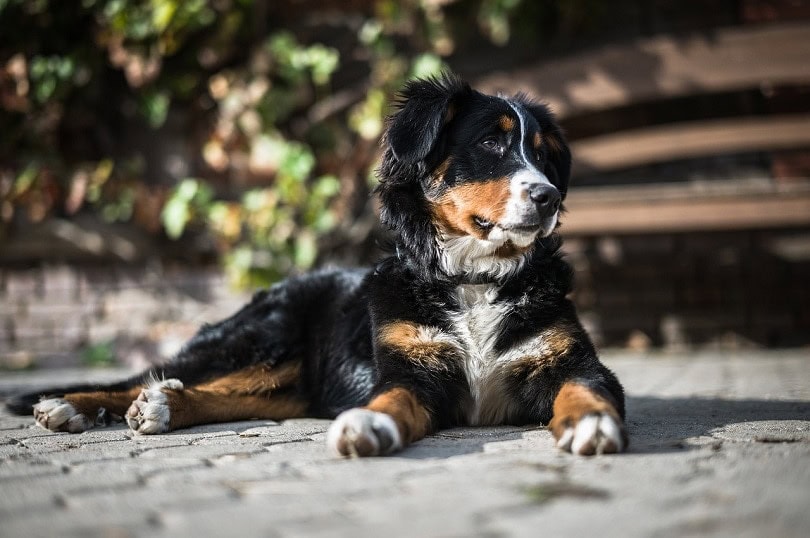
Grooming ✂️
This breed has medium-to-long length hair that is very dense, so be prepared for weekly brushing to avoid it becoming matted or tangled. You’ll also want to keep up with weekly brushing to cut down on shedding and subsequent vacuuming. You won’t avoid shedding entirely though, as this breed sheds regardless of the season.
The good news is that you won’t need to bathe your pup too often — once a month or even once every other month should be plenty. Once you get your mammoth of a dog in a bathtub or kiddie pool, you’ll be thankful that bathing is infrequent!
You should keep your dog’s nails trimmed and ears cleaned as well to avoid cracked or broken nails as well as ear infections. Bernese Mountain Dogs are also prone to tooth and gum issues, so prepare to brush your pup’s teeth every other week or so to help limit issues. Getting them teeth-cleaning toys or treats can also help you keep up with their dental hygiene.
Speaking of dental hygiene, you should also be prepared to wipe slobber off of your dog’s chops often. This breed drools quite a bit, and while wiping their mouths a few times throughout the day won’t limit dental problems, it will keep the slobber off of your floors.
Health and Conditions❤️
Unfortunately, this breed is prone to a myriad of health problems, several of which are very serious and life-threatening in some cases. You should plan on frequent vet visits with this kind of dog, and you should always be mindful of the below health issues.
- Obesity
- Epilepsy
- Eye problems, including retinal atrophy
- Hip dysplasia
- Bloat
- Organ damage
- Tooth and gum problems
- Cerebellar abiotrophy
Male vs Female
Male Bernese Mountain Dogs are usually larger and can easily top 100 pounds, while females will usually be under this weight and a bit shorter. Both genders are equally as likely to be affectionate, energetic, and loving. You may find that males are a bit more alert and protective of your home. For the most part, temperament in this breed isn’t dependent on their sex.

Final Thoughts:
Bernese Mountain Dogs are wonderful companions for families and singles that have time, attention, and affection to give. These dogs love being around their humans, so they’re the perfect companion dog that will stick by you no matter what.
These dogs are large and strong, but they’re also gentle and abundantly friendly toward most people they meet, family and strangers alike. They’re moderately active, and they have an appetite that will put any other dog’s food intake to shame.
Although these dogs, unfortunately, have one of the shortest lifespans of any dog breed and are prone to some pretty serious health issues, the love and adoration you will get from a Bernese Mountain Dog will make the absolute best of the years they do spend by your side. If you’re looking for a big mush of a pup who will bring you a ton of joy, happiness, and laughs, the Bernese Mountain Dog may be the perfect companion dog for you!
See Also:
- Are Bernese Mountain Dogs Hypoallergenic? The Surprising Answer!
- How Much Does a Bernese Mountain Dog Cost?
Featured Image Credit: Eve Photography, Shutterstock





